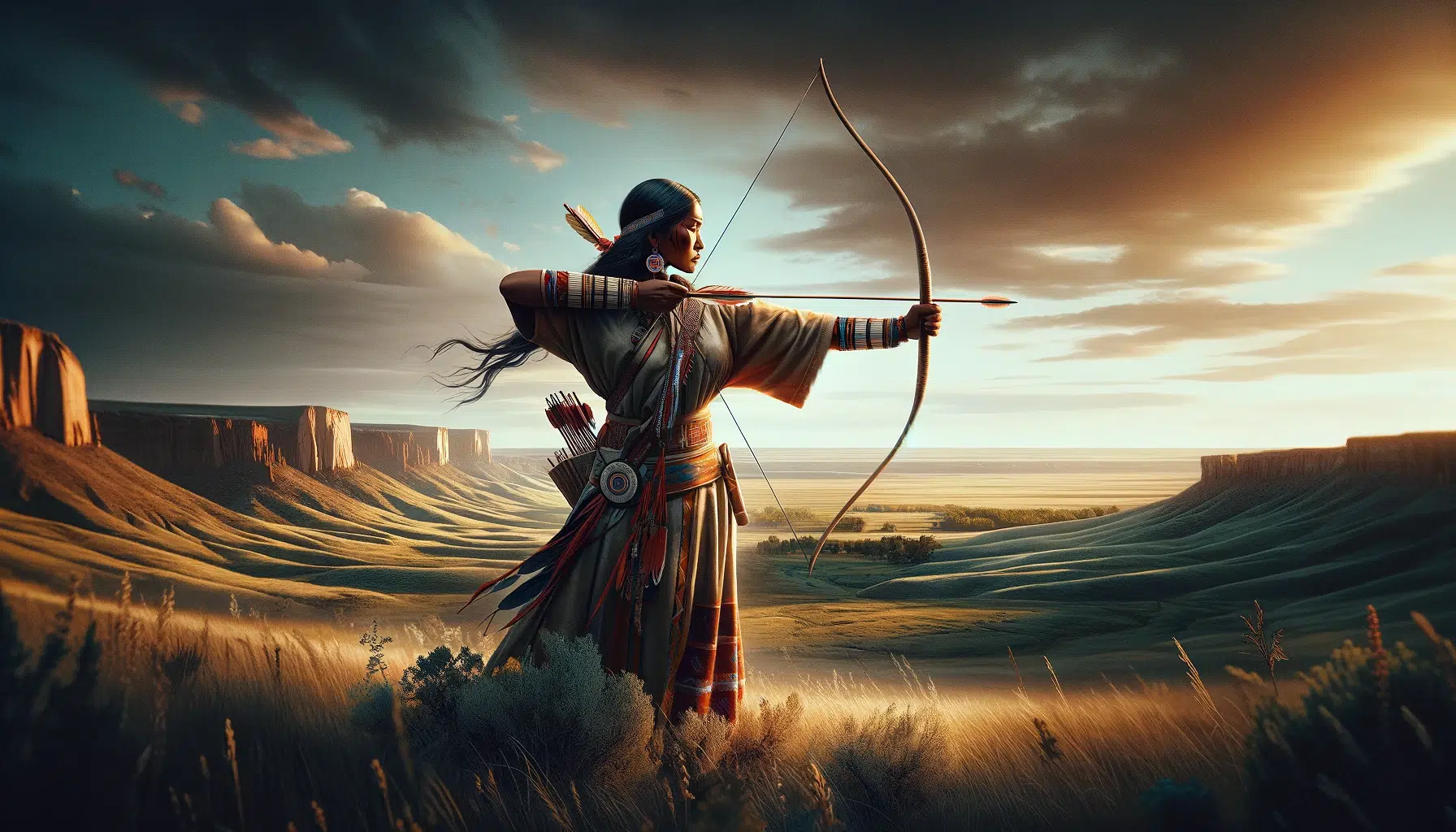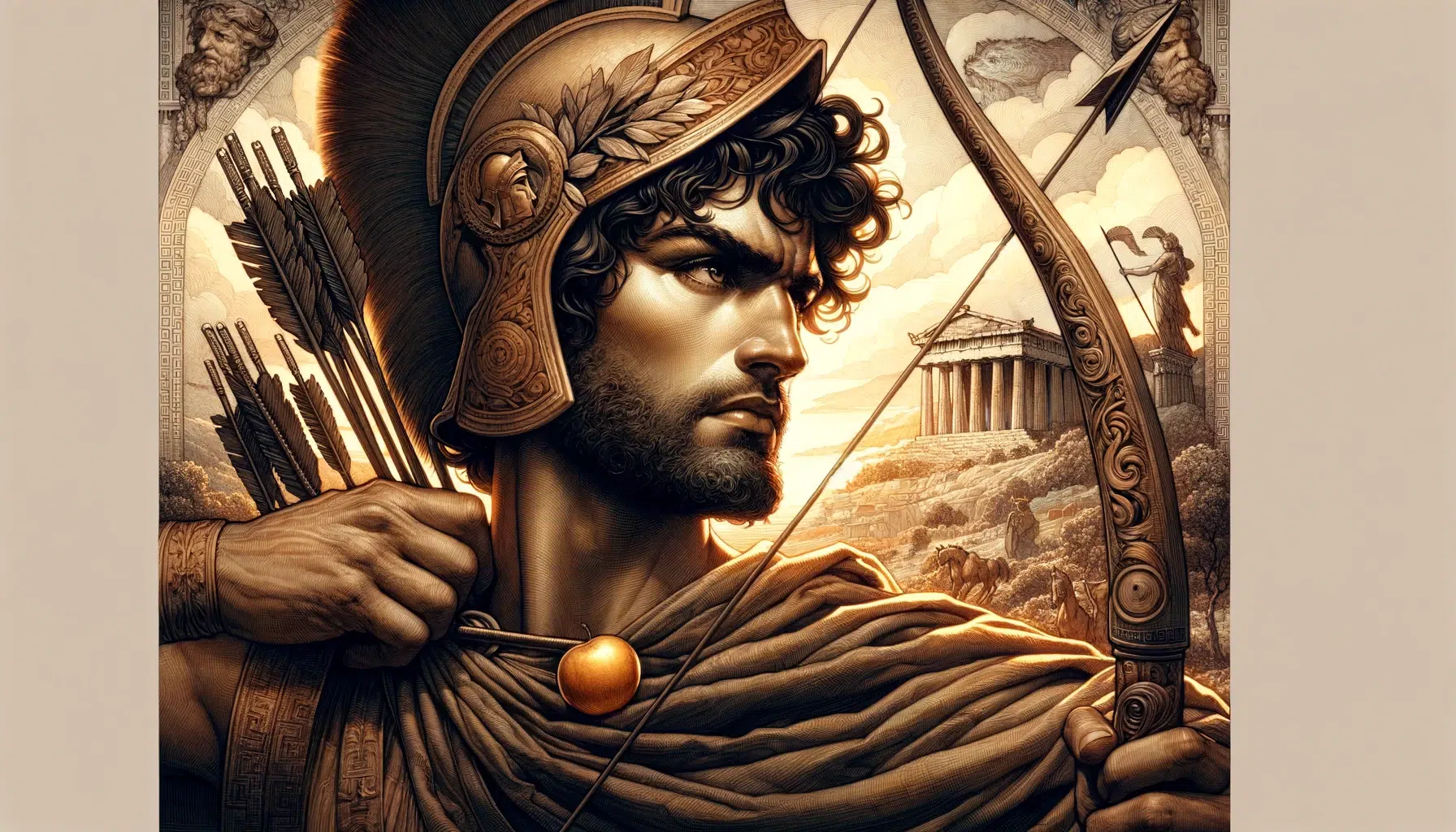
Famous Archers in Mythology
In the realm of mythology, names like Artemis, Robin Hood, and William Tell have gained worldwide renown.
However there are many extraordinary archers in mythology who are not as well known.
From the far reaches of ancient China to the mystical lands of Norse mythology, let’s embark on a journey to discover famous archers in mythology.
Famous Archers in Mythology
Hou Yi – The Chinese Sun Hunter

Hou Yi, a famous archer in Chinese mythology, stands as a symbol of heroism and skill.
According to legend, the earth once suffered under the scorching heat of ten suns. Hou Yi, equipped with a bow and arrow, embarked on a mission to save the world.
He shot down nine of these suns, leaving just one to provide light and warmth. This act not only saved the earth from destruction but also established Hou Yi as a hero. His story is rich with themes of sacrifice, balance, and responsibility.
Hou Yi’s actions reflect the ancient Chinese values of harmony with nature and the importance of selfless acts for the greater good.
The legend also touches on themes of power and the consequences of its misuse, as seen in later parts of Hou Yi’s story, involving a quest for immortality.
Today, Hou Yi’s tale is celebrated in many Chinese festivals and artworks. It serves as a reminder of the virtues of bravery and selflessness.
His legacy continues to inspire and captivate people, highlighting the enduring nature of myth and legend in Chinese culture. Hou Yi’s legend thus remains a profound and integral part of China’s rich mythological tapestry.
Jumong – Founder of Goguryeo, Korea

Jumong, a legendary figure in Korean history, is renowned as the founder of the ancient Goguryeo Kingdom. His story begins with a mystical birth, marked by prophecy and divine intervention.
Jumong displayed exceptional archery skills from a young age, a talent that later defined his legacy. He was not only a skilled archer but also a visionary leader.
His ability to unite various peoples under his rule laid the foundation for one of Korea’s Three Kingdoms. Jumong’s legend symbolizes perseverance and leadership.
It teaches the importance of overcoming obstacles and uniting people for a common cause. The tale also highlights the cultural significance of archery in ancient Korean society, where it was revered as a vital skill for survival and warfare.
In modern Korea, Jumong’s story continues to inspire. It is a subject of popular TV dramas and cultural narratives.
His legacy shapes Korean identity and historical pride. Through Jumong, Koreans connect with their ancient past and the virtues of courage, skill, and determination.
His story, transcending centuries, remains a powerful testament to the enduring nature of folklore and its impact on national identity.
Learn more about archers in Korean Mythology:
Karna – The Unmatched Archer of Indian Epic

Karna, a central figure in the Indian epic Mahabharata, stands as an epitome of bravery and loyalty. His life, marked by trials and tribulations, showcases his unwavering dedication and unmatched archery skills.
Born to a princess but raised as a charioteer’s son, Karna’s journey was one of constant struggle against societal norms. Despite these challenges, he became a warrior par excellence, famed for his skill with the bow and arrow.
His archery prowess, combined with his unyielding spirit, earned him a legendary status. Karna’s loyalty to his friend Duryodhana, even in the face of moral dilemmas, highlights his complex character.
His life story, interwoven with themes of fate, honor, and tragedy, resonates deeply in Indian culture.
Karna is often revered as a tragic hero, a character who despite his virtues, faces a downfall due to destiny and personal choices. His legacy in Indian mythology goes beyond his martial abilities; it symbolizes the human struggle against fate and societal constraints.
His story, a blend of heroism and human flaws, continues to be retold in various forms, underlining the richness and depth of Indian mythology.
Na’zōōē Woman – A Native American Tale

In Native American lore, the Na’zōōē Woman emerges as a figure of strength and prowess. Belonging to the Kiowa Apache people, she stands out as a warrior woman, breaking the conventional boundaries of gender roles.
Her exceptional skills with a bow earned her a revered status among her people. She fought bravely in battles, often standing shoulder to shoulder with male warriors.
Her story is a testament to the empowerment of women in Native American societies. It challenges the stereotypical portrayal of women in mythology as mere secondary characters or damsels in distress.
Instead, Na’zōōē Woman is a protagonist, a fierce warrior with skills equal to, if not surpassing, those of her male counterparts.
This tale also highlights the importance of women in the cultural and spiritual life of Native American peoples. Na’zōōē Woman’s story is not just about physical strength; it encompasses wisdom, courage, and leadership.
Her legacy continues to inspire, serving as a powerful symbol of female empowerment and resilience. Through her story, we gain insight into the rich tapestry of Native American folklore, where women play crucial and diverse roles.
She is a lesser known archer of mythology.
Learn more about Native American mythology:
- Cherokee Legend of Awi Usdi: Little Deer
- Tecumseh: Chief’s Quest for Indigenous Unity
- The Legend of White Buffalo Calf Woman
- Wakan Tanka: Supreme Being in Lakota Mythology
Paris of Troy – The Ill-Fated Archer of Mythology

Paris of Troy, a pivotal character in Greek mythology, is best known for his role in the Trojan War. His decision to elope with Helen, the queen of Sparta, sparked one of the most famous conflicts in ancient lore.
However, Paris’s skills as an archer also play a significant part in his story. His fateful shot, which led to the demise of the Greek hero Achilles, is one of the most iconic moments in the tale of the Trojan War.
This act of archery, guided by the god Apollo, symbolizes the intertwining of human actions with divine intervention in Greek mythology.
Paris’s arrow striking Achilles’ heel signifies the vulnerability and mortality of even the greatest heroes. Paris’s story is a complex weave of romance, destiny, and tragedy.
His actions, driven by love and desire, set the course for a war that ended in destruction and loss. His role as an archer, though less emphasized, is crucial in understanding the depth of his character and the consequences of his actions.
The legend of Paris of Troy, particularly his skill with the bow, highlights the themes of fate and the human condition in Greek mythology. It reminds us of the far-reaching impact of our choices and the often unpredictable nature of life’s journey.
Other Greek mythology legends
-
- Artemis: Ancient Greek Goddess of Archery
- Atalanta: Fabled Archer to Legendary Heroine
- Eros: History of the Greek God of Love
- Gods and Archery in Greek Mythology Books
- God of Archery: Norse, Greek & Roman Mythology
- Hector of Troy: Legendary Trojan Warrior
- Hippolyta: Queen of the Amazons in Greek Mythology
- Penthesilea: Amazon Queen Who Died in Trojan War
- Philoctetes: The Legendary Greek Archer and Healer
Hayk – Legendary Armenian Archer of Mythology

As a revered figure in Armenian mythology, Hayk is celebrated as a symbol of freedom and resistance. His story centers around his rebellion against Bel, a tyrannical Babylonian king.
Known for his exceptional skills with a bow, Hayk’s most famous moment comes during a decisive battle, where he triumphantly uses his archery skills to defeat Bel.
This victory is seen as a foundational moment in Armenian history, representing the struggle for independence and self-determination.
Hayk’s tale goes beyond mere martial prowess. It embodies the Armenian spirit of resilience and the importance of standing against oppression.
His victory over Bel is celebrated annually on Navasard, an Armenian holiday that marks the New Year, symbolizing the rebirth and renewal of the Armenian people.
In Armenian culture, Hayk is not just a mythical figure but a national hero. His story has been passed down through generations, becoming an integral part of Armenian identity.
It inspires pride and a sense of unity among Armenians. The legacy of Hayk, particularly his skill as an archer of mythology, highlights the enduring nature of folklore in shaping national consciousness.
His story reminds us of the power of resistance and the enduring fight for freedom and dignity.
Mwindo – The Hero of Nyanga Mythology

As a celebrated hero in the mythology of the Nyanga people of the Democratic Republic of Congo, Mwindo embodies a fusion of strength, wit, and magic.
His epic tale begins with his miraculous birth, showcasing his uniqueness and destined greatness. Mwindo possessed supernatural abilities, including the skill to wield a magical spear, akin to a bow at times.
Thus symbolizing his combat and leadership prowess. This skill established him as a legendary archer in mythology.
His hero’s journey unfolds through adventures and challenges, facing and defeating various adversaries, including nature, spirits, and other peoples. These stories highlight Mwindo’s intelligence, bravery, and resilience.
They also reflect the cultural values of the Nyanga people, emphasizing the importance of courage, wisdom, and the power of good over evil.
Mwindo’s tale is not just an action-packed adventure; it carries deep moral and philosophical meanings. It explores themes of leadership, redemption, and the complexities of human relationships.
His story, often passed down through oral tradition, remains a significant part of the cultural heritage of the Nyanga. Mwindo’s legacy, as a hero who skillfully navigates a world filled with challenges and magic, continues to captivate and inspire.
His epic stands as a testament to the rich storytelling tradition of African cultures and their ability to convey profound truths through myth and legend.
Ullr – The Norse God of Archery

In Norse mythology, Ullr stands as a unique and mysterious deity, revered for his skills in archery and skiing. As a skilled hunter and warrior, Ullr’s proficiency with the bow made him a respected figure in the Norse pantheon.
Though he remains less well-known than gods like Odin and Thor. Ullr’s association with archery and winter sports reflects the ancient Norse culture’s deep connection with nature and skill in survival and warfare.
As a god of winter, Ullr also invokes protection in cold and snowy environments. A testament to the harsh conditions faced by the Norse people.
In modern times, Ullr’s legacy continues, particularly in winter sports communities. He is often celebrated in festivals and events related to skiing and archery, highlighting the enduring nature of his myth.
Ullr’s story adds depth to the Norse mythology, portraying a deity who embodies the essential skills of archery and skiing. Crucial skills for survival in the Nordic landscape.
His presence in Norse lore underlines the importance and reverence of these skills in ancient Norse society. Ullr’s legacy thus not only reflects the past but also continues to resonate in contemporary culture. Especially in regions where winter sports are a way of life.
Learn more about other archers in mythology -Norse gods:
Famous Archers in Mythology Admired Across Cultures
These mythical archers from different cultures showcase the global admiration for the art of archery. Each story is rich in symbolism and cultural significance.
Inviting us to delve deeper into the myths and legends in archery that have shaped civilizations. These tales not only entertain but also illuminate the values and beliefs of the cultures they originate from.




